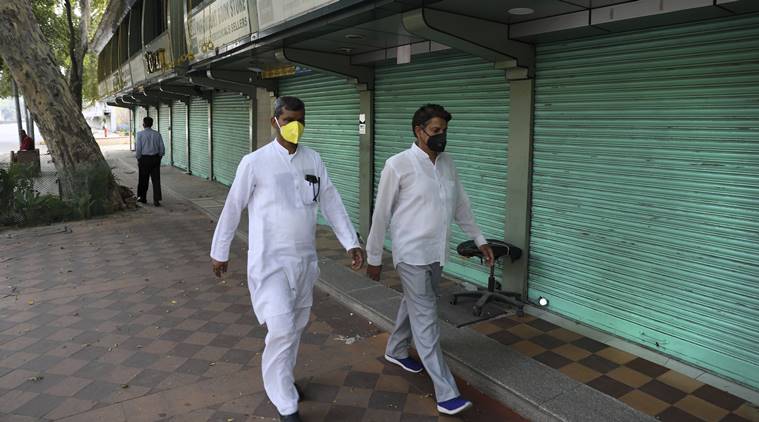 The CM assured that the fund shall be utilised only for supporting those who have been badly affected by this pandemic situation in Haryana. (File)
The CM assured that the fund shall be utilised only for supporting those who have been badly affected by this pandemic situation in Haryana. (File)
THE HARYANA government has prepared a four-tier strategy for door-to-door mapping across the state by dividing it into areas under polling booths. To begin with, four committees that will monitor the health statistics and delivery of essential commodities to each household across the state are being constituted in every district.
Chief Secretary Keshni Anand Arora issued instructions to all deputy commissioners to immediately constitute unit committees, sector committees, zonal committees and district committees.
“The unit committee will be working at the first level as an administrative unit for around 250-300 households, preferably with polling booth area. Preferably, a government employee, a local resident of that unit area or neighbouring unit area, along with the active/prominent local social worker/volunteer/member of civil society organizations will be deployed,” said the instructions.
“Over 70,000 volunteers have so far registered themselves with the state government. All these who include doctors, nurses, paramedical staff, ex-servicemen, students, academicians, retired government employees and many others shall be utilized across the State, as and when their services are required,” Chief Minister Manohar Lal Khattar had said.
Unit committee
Specific roles and responsibilities have also been assigned to these committees. According to the mandate of each such committee, “The unit committee will carry out a listing of all households in its assigned area. The needy and poor households will be identified separately and their requirement of dry ration and/or cooked food will be determined and the committee shall ensure that an adequate quantity is provided to such households. Any other requirements of specific class of households such as old age persons, single women households, households with children with special needs etc will also be recorded and the committee shall make efforts to provide for all such requirements whose availability has got disrupted due to the COVID-19 lockdown.”
“The unit committee will also ensure that these dry rations or cooked food are sourced through local welfare organisations and only when the demand cannot be met through these organisations, government funding can be used to provide for the requirements of such poor and needy families. It will be incumbent upon the committee to ensure that no needy or poor family in its area is deprived of its necessities of food and other essentials such as medicines, old age care, therapists etc. and the committee will also be responsible for ensuring a smooth and steady supply of these essential commodities and services on a daily basis,” the detailed set of instructions issued, read.
The government has also empowered these unit committees to undertake “the verification of financial assistance provided to eligible households (MMPSY, BPL, registered construction workers’ or unorganised workers’ families in the unit area”.
Sector committee
At the second tier comes the sector committee, which comprise around 12-15 administrative unit committees and shall also be headed by a government employee senior to the employee heading the unit committee. The other member of the committee would be the active/prominent members of civil society organisation of any other social worker/volunteer/member of civil society organisations.
Zonal committee
At the third tier, a cluster of 15 sector committees will be constituted as administrative unit supervised by a zonal committee coterminous block or urban local body of the area headed by EDPO or EO municipal committee or secretary, municipal committee alongwith active/prominent members of civil society organisation or any other social worker/volunteer member of civil society organisations.
District committee
At the fourth and highest tier, a district level committee headed by the concerned deputy commissioner shall supervise all the three committees. Other members of the committee would be active/prominent member of civil society organisation or any other social worker/volunteer/member of civil society organisations.
“Number of members of all the above committees can vary depending upon local requirements. All appointments are to be made by the concerned deputy commissioner and administrative boundaries of units/ sectors and zones can be determined/ varied as per local conditions by the deputy commissioners,” Chief Secretary Keshni Anana Arora said in her directions issued to all DCs.
The sector level committee will monitor and supervise the activities of unit level committees and provide assistance and support as and when required. It will also act as a link between the unit and zonal level committees and ensure proper reporting of the activities of the unit committees to zonal committees.
The zonal level committee will be the apex body at the zonal level. It will report to the deputy commissioner on a regular basis and ensure that the entire implementation of relief measures within the block reaches out to each and every needy and poor family in the block.
“The deputy commissioners will also ensure that a coordinated and integrated response of the government and welfare organisations reaches out to all the needy and poor families…It is further directed that deputy commissioners ensure streamlining of the relief and food distribution measures announced by the government through this administrative structure…”, the chief secretary said in the directions issued.